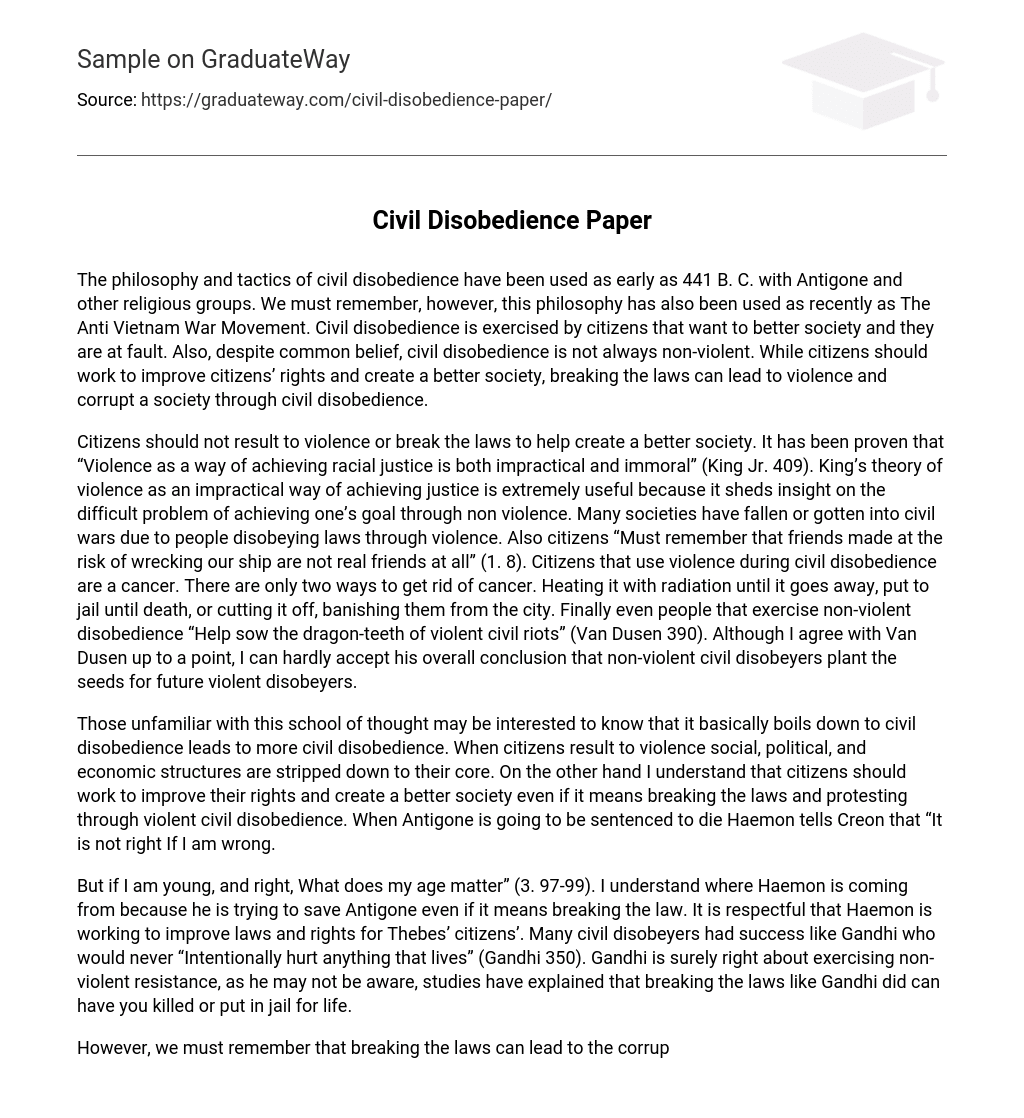The philosophy and tactics of civil disobedience have been used as early as 441 B. C. with Antigone and other religious groups. We must remember, however, this philosophy has also been used as recently as The Anti Vietnam War Movement. Civil disobedience is exercised by citizens that want to better society and they are at fault. Also, despite common belief, civil disobedience is not always non-violent. While citizens should work to improve citizens’ rights and create a better society, breaking the laws can lead to violence and corrupt a society through civil disobedience.
Citizens should not result to violence or break the laws to help create a better society. It has been proven that “Violence as a way of achieving racial justice is both impractical and immoral” (King Jr. 409). King’s theory of violence as an impractical way of achieving justice is extremely useful because it sheds insight on the difficult problem of achieving one’s goal through non violence. Many societies have fallen or gotten into civil wars due to people disobeying laws through violence. Also citizens “Must remember that friends made at the risk of wrecking our ship are not real friends at all” (1. 8). Citizens that use violence during civil disobedience are a cancer. There are only two ways to get rid of cancer. Heating it with radiation until it goes away, put to jail until death, or cutting it off, banishing them from the city. Finally even people that exercise non-violent disobedience “Help sow the dragon-teeth of violent civil riots” (Van Dusen 390). Although I agree with Van Dusen up to a point, I can hardly accept his overall conclusion that non-violent civil disobeyers plant the seeds for future violent disobeyers.
Those unfamiliar with this school of thought may be interested to know that it basically boils down to civil disobedience leads to more civil disobedience. When citizens result to violence social, political, and economic structures are stripped down to their core. On the other hand I understand that citizens should work to improve their rights and create a better society even if it means breaking the laws and protesting through violent civil disobedience. When Antigone is going to be sentenced to die Haemon tells Creon that “It is not right If I am wrong.
But if I am young, and right, What does my age matter” (3. 97-99). I understand where Haemon is coming from because he is trying to save Antigone even if it means breaking the law. It is respectful that Haemon is working to improve laws and rights for Thebes’ citizens’. Many civil disobeyers had success like Gandhi who would never “Intentionally hurt anything that lives” (Gandhi 350). Gandhi is surely right about exercising non-violent resistance, as he may not be aware, studies have explained that breaking the laws like Gandhi did can have you killed or put in jail for life.
However, we must remember that breaking the laws can lead to the corruption of society even if it is through non-violence. Like when Antigone violates “The state edict against providing burial for her brother who had been decreed a traitor” (Van Dusen 386). Thebes eventually falls because of peasant revolts against the king Creon and this all happens because Antigone, a civil disobeyer, broke the laws. This furthers the point that people should improve citizens’ rights they should not do it while breaking the laws or with violence.
We must remember that breaking the laws can lead to violence and corrupt a society through civil disobedience. When Haemon is trying to talk Creon out of killing Antigone he tells him that “Her death will cause another” (3. 119). Haemon states the fact that Antigone broke the law, and her death will lead to revolt and many more deaths. This would also corrupt society because there would be no political structure. King also claims that violence and injustice “Lead to the destruction of all things just” (King 409). When King suggests the destruction of all, he means the whole society not just certain social classes of people.
This is important because if a civil disobedience movement occurs again we have evidence from some of the greatest leaders ever stating that it is not right to use violence and break the laws. Van Dusen talks about how a “Civil disobedient withholds taxes or violates laws knowing he is morally wrong” (Van Dusen 387). He references how Martin Luther King Jr. was not a civil disobedient, and people realize that he achieved his goal without actually breaking the laws. I agree that a civil disobedient is a cancer because the evidence of societies with civil disobedience all result in them ultimately falling.
This is why breaking the laws and resulting to violence might achieve the overall goal but will eventually corrupt the society. Citizens should try to improve their rights for the better of their entire society, but they should not break the laws because it could lead to the downfall of their own society. They need to do non-violent peaceful protesters like Gandhi, King, and Thoreau. The consequences of violent disobedience can be great in small or big towns, areas, or leaders.
Works Cited
Gandhi, Mahatma. “Letter to Lord Irwin. ” Argument in America: Essential Issues, Essential Texts. Ed. Jack Selzer. New York: Penguin Academics, 2004. 350- 355. Print. King Jr. , Martin Luther. “The Ways of Meeting Oppression. ” Models for Writers: Short Essays for Composition. Eds. Alfred Rosa and Paul Eschholz. Boston: Bedford/St. Martin’s, 2004. 408-411. Print. Sophocles. Antigone. Trans. Dudley Fitts and Robert Fitzgerald. Holt McDougal Literature: Grade 10. Eds. Janet Allen et al. Evanston, IL: Holt McDougal, 2010. 1068-1106. Print. Van Dusen, Jr. , Lewis H. “Civil Disobedience: Destroyer of Democracy. ” Argument in America: Essential Issues, Essential Texts. Ed. Jack Selzer. New York: Penguin Academics, 2004. 386-392. Print.





